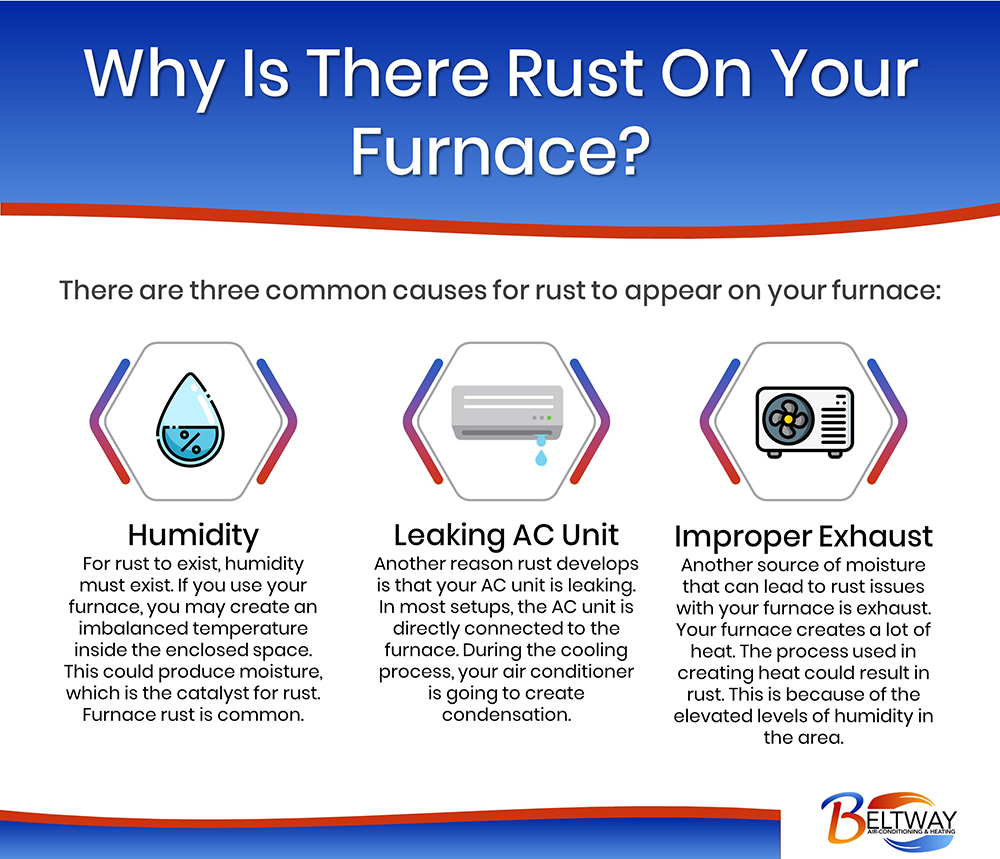Updated: September 12, 2023
Rust may be reddish-brown or yellowish flakes found on iron or steel. Rust forms because of oxidation. You will typically see rust in areas where there is high humidity. There must be metal, water, and oxygen for rust. That is why it is unsurprising to see rust form on a water heater.
However, your furnace doesn’t heat or use water as part of the heating process. It is understandable if you are curious about why rust forms in your furnace. You may also wonder what problems rust on your furnace or HVAC system could cause.
Why Is There Rust on Your Furnace?
There are three common causes for rust to appear on your furnace:
Humidity: For rust to exist, humidity must exist. If you use your furnace, you may create an imbalanced temperature inside the enclosed space. This could produce moisture, which is the catalyst for rust. Furnace rust is common.
There is typically much moisture in the air if you live in a humid climate. You may inadvertently make the problem worse by adding more moisture into the air by not repairing water leaks or filtration in the area around your furnace.

Leaking AC Unit: Another reason rust develops is that your AC unit is leaking. In most setups, the AC unit is directly connected to the furnace. During the cooling process, your air conditioner is going to create condensation.
Your AC unit should have a condensation tray to collect this moisture. However, the condensation tray may be full or broken. This allows water to infiltrate your furnace, creating conditions where rust can form.
Additionally, your air conditioner is integrated into the same ductwork as your furnace if you have central AC. If there is any leak in your AC unit, it can find its way into your heating system and then produce the circumstances where rust can develop.
Improper Exhaust: Another source of moisture that can lead to rust issues with your furnace is exhaust. Your furnace creates a lot of heat. The process used in creating heat could result in rust. This is because of the elevated levels of humidity in the area.
Your furnace will raise the temperature of the surrounding air to a high level. However, that air will cool quickly as it leaves the burners. This will generate enough moisture in the system’s interior, leading to rust production.
Remember that your furnace, like every other heat exchanger, uses the process of condensation, evaporation, convection, and combustion to heat and move air.
Some energy-efficient furnaces have two heat exchangers. The second heat exchanger takes any water vapors from the hot flue gases and condenses them. This way, more heat can be extracted, allowing you to heat your house more efficiently. However, when there is condensation, there is water and the potential for rust.
When everything is working correctly, your condensation drain should remove the water from your furnace. However, your condensation line may be damaged or inefficient.
During frigid winters, your condensation line can freeze. Or your drain line may become clogged with dirt, algae, or another residue. In some cases, a leaky drainpipe is causing your furnace to rust over time.
Should You Be Concerned About Rust on Your Furnace?
Just about every furnace is going to rust eventually. Most furnaces are designed to work for between 10 and 15 years. Rust does not happen overnight. It is a gradual process that occurs as your furnace repeats the heating and cooling process.
If you notice that an older furnace has rust, there is no reason to panic. Beltway Air Conditioning & Heating has experienced HVAC technicians who can evaluate your furnace’s condition and provide you with solutions to either repair damaged areas or start the process of replacing your furnace.
If your heat exchanger is rusting and you do not replace or repair the unit, you risk having carbon monoxide enter your home. While a small amount of rust on an older furnace is not a significant cause for immediate concern, rapidly expanding rust on a newer model or a lack of rust on your older furnace would merit further investigation.
The Dangers Produced by a Rusting Furnace
If left unchecked, rust will make your system degrade faster than it typically would. For example, rust on the burner jets will eventually clog them, diminishing their effectiveness. This means that your unit will need more fuel to provide the same level of heat. This inefficient performance leads to an increase in carbon monoxide being released into your home. This is dangerous for you and your furry friends.
Rust may affect your unit’s fuel supply lines. If this happens, you are in a hazardous situation. A life-threatening and property-damaging fire or explosion could occur. A severely rusted furnace is more than just an eyesore. If you notice that the exterior of your furnace has rust, the interior is likely already corroded by rust.
Purchasing a furnace is a considerable investment. You want your furnace to last for as long as possible. Thankfully, you can do a few things to keep your furnace working its best.
Monitor and Prevent Rust With Annual Furnace Maintenance
Yearly furnace maintenance includes an in-depth inspection of your system. It is affordable and will save you money in the long run, especially when you compare the price of maintenance to the cost of repairing or replacing your unit. Our HVAC technicians will thoroughly inspect your unit during a maintenance check, so you will know that your system is working as it should.
Fix Furnace Issues Quickly
A severely rusted furnace not only impacts how well the furnace functions, but it also puts the health and well-being of your family at risk. Therefore, you should make it a priority to repair furnace issues immediately.
The goal is to identify the reason behind the rust in your furnace. Resolve those issues or eliminate them promptly. Once the problems have been resolved, all corroded parts should be repaired or replaced.
In some cases, depending on the age of your furnace and the severity of the degradation, your system may require more than just a repair. The expense of bringing your furnace back to safe conditions may be more than what the unit is worth. Please consult with our HVAC technicians. We will be happy to help you with any rust furnace problems.
If You See Rust, What Should You Do?
If you see rust on your furnace, contact our experienced HVAC technicians. Rust means that there is condensation somewhere, which could indicate a more significant problem. Remember, just because you see rust, it doesn’t mean that you will necessarily have an expensive repair bill.
At Beltway Air Conditioning & Heating, we have been serving Handover and the surrounding area by providing top-notch HVAC system installation and repairs for years. We are proud to be distributors of the most energy-efficient, dependable furnaces, boilers, air conditioners, and heat pumps on the market. Whether residential or commercial, our technicians have the experience, skills, and tools needed to keep your space comfortable.
Do you need your furnace inspected? Do you need to heating repair or furnace replacement? If so, contact us today. We have the knowledge, expertise, and experience to do the job right.


